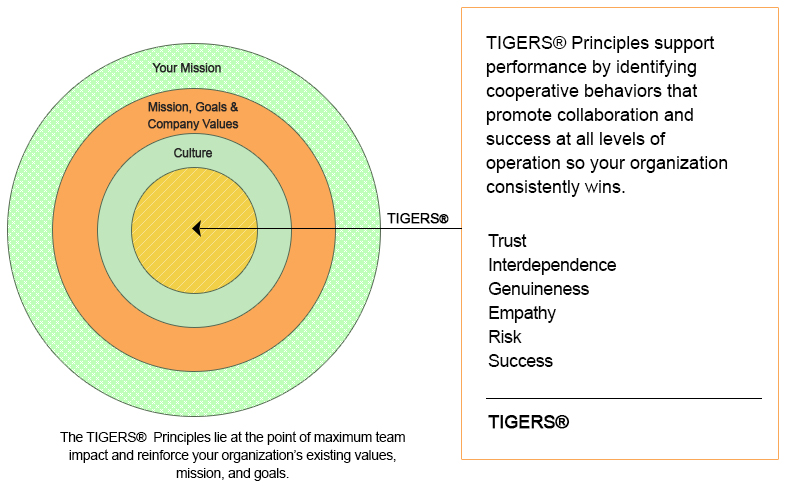 When asked why she prefers consistent feedback over annual reviews in the workplace, founder of TIGERS® model of group and leadership development, Dianne Crampton, commented that,
When asked why she prefers consistent feedback over annual reviews in the workplace, founder of TIGERS® model of group and leadership development, Dianne Crampton, commented that,
“Nothing makes me happier when I see success to comment on it immediately. If I see something that can be fine-tuned, it also makes me happy to share that insight for course correction. In my view nothing succeeds like success.”
Rather than waiting for the annual review to give praise or share a constructive insight, Dianne Crampton finds that responding promptly helps employees meet expectations and feel good about their work.
“When people get what success looks like they know what to strive for. It is as simple as that. Who wakes up in the morning saying, ‘Oh, boy. I get to work in a void.’ A void of no feedback. A void of not knowing if I am doing well or not. A void of no contact.”
In other words, when there is a lack of feedback or reviews are far-and-few-between, both the company and the employee suffer. In order for the business to succeed, everyone needs to be on the same page.
A recent study informed readers that 72 percent of employees who receive consistent feedback report finding their jobs more fulfilling. Seventy-two percent is a number to pay attention to.
Here are some reasons why you should consider providing frequent feedback and how important it is for a business to be successful.
Recognition and learning through consistent feedback
The saying goes, “Give a man a fish, and you feed him for a day; teach a man to fish, and you feed him for a lifetime.” It’s the same with feedback. Give your employees an annual review and you give them something to think about for a day. However, giving frequent feedback every few weeks teaches your employees to fish. Through helping them recognize their accomplishments and letting them know what works and what doesn’t teaches them a long term, useful skill.
Providing frequent feedback not only guides your employees toward recognizing their weaknesses and strengths, but it also helps them learn how to work with these characteristics. Rather than both of you ignoring a flaw, bring it up so that it can be dealt with.
Honesty is the best policy when providing consistent feedback
While many employees crave regular feedback, many employers wish they could avoid frequent review sessions. It’s true, sometimes providing feedback can be uncomfortable, especially when the employee has not been performing to the best of his ability. However, it can also be highly rewarding for both the employee and employer, when success and a job well done can be celebrated together as a team.
Although it may be uncomfortable to be honest, make sure to always be straightforward with your employees. They shouldn’t find out in their annual review session that there was disappointment with their work. Help your employees find solutions if they are struggling in some areas, and if they are succeeding, give them constructive feedback about good work. Over time, you both should see a large improvement in both your working relationship and overall performance.
Use specific examples when providing consistent feedback
Sometimes it can be hard to give good, useful feedback if you don’t have specific examples. For example, saying good job is nice to hear but what about the job was good?
Just like in any personal or working relationship, you can’t just say that you are unhappy with the way things are going. Rather, by constructively bringing up how a certain thing is working, how it is affecting an aspect of business, and a good solution to the problem, you will be giving a specific example as well as a proposed solution. This will go a long way in terms of your relationship as boss and employee.
As you begin to give regular reminders and particular examples, you notice your employee’s performance, attitude, and skill level change significantly faster. Through providing this consistent feedback, your employees not only learn how to address the bigger picture, but also feel more motivated to improve.
Conclusion:
At first, providing consistent feedback can be hard. However, by supporting your employees through regular, constructive interactions you don’t create a ‘void of no feedback.’ In contrast, your employees find their jobs more fulfilling, your business profits, and everyone has a clearer goal to strive towards.
As long as your feedback is thoughtful, honest, and specific both you and your employees flourish. Above all else, remember to provide helpful recognition almost as much as you critique. Too much negativity can make anyone feel bad about themselves. Mix it with positive comments and you create a thriving workplace community that has high expectations around work and solid employee guidance relationships.
Be the manager who encourages people to become better, acknowledges those who are struggling, and works with everyone’s best interest in mind. You find employees’ desire to go the extra mile for you, increasing your business success. In the words of our founder, Dianne Crampton, ‘nothing succeeds likes success.’
Want to learn more about giving constructive, consistent feedback?
Check out the links below.
- TIGERS Success Series Genuineness Micro Training – 52 weeks of strategic training that builds skills that are respectfully sincere, frank and forthright.
- There Is No Feedback Fallacy: Understanding The Value Of Feedback
- Best Practices For Switching From Annual Performance Reviews To More Frequent Feedback
- How To Give Negative Feedback More Effectively
- The Do’s And Don’t For Providing Feedback
Copyright TIGERS Success Series, Inc. by Izabela Zagorski
About TIGERS Success Series, Inc.
 TIGERS® Success Series provides a comprehensive, multi-pronged and robust system for improving both your work environment, profitability and project management team leadership success.
TIGERS® Success Series provides a comprehensive, multi-pronged and robust system for improving both your work environment, profitability and project management team leadership success.
We specialize in training your managers in group leadership skills that build workforce cooperation and high performance project team outcomes . Scaled to grow as your organization and leadership performance grows, our proprietary TIGERS Workforce Behavior Profile, Micro-Training technology that compliments your TIGERS Workforce Behavioral Profile results for high performance change management results, Management and Project Team Leadership training workshops, and elite consultant/project manager licensing is based on the TIGERS 6 Principles(TM) that our extensive research found to be the high performance mix to make this happen. Schedule a consultation to learn more.